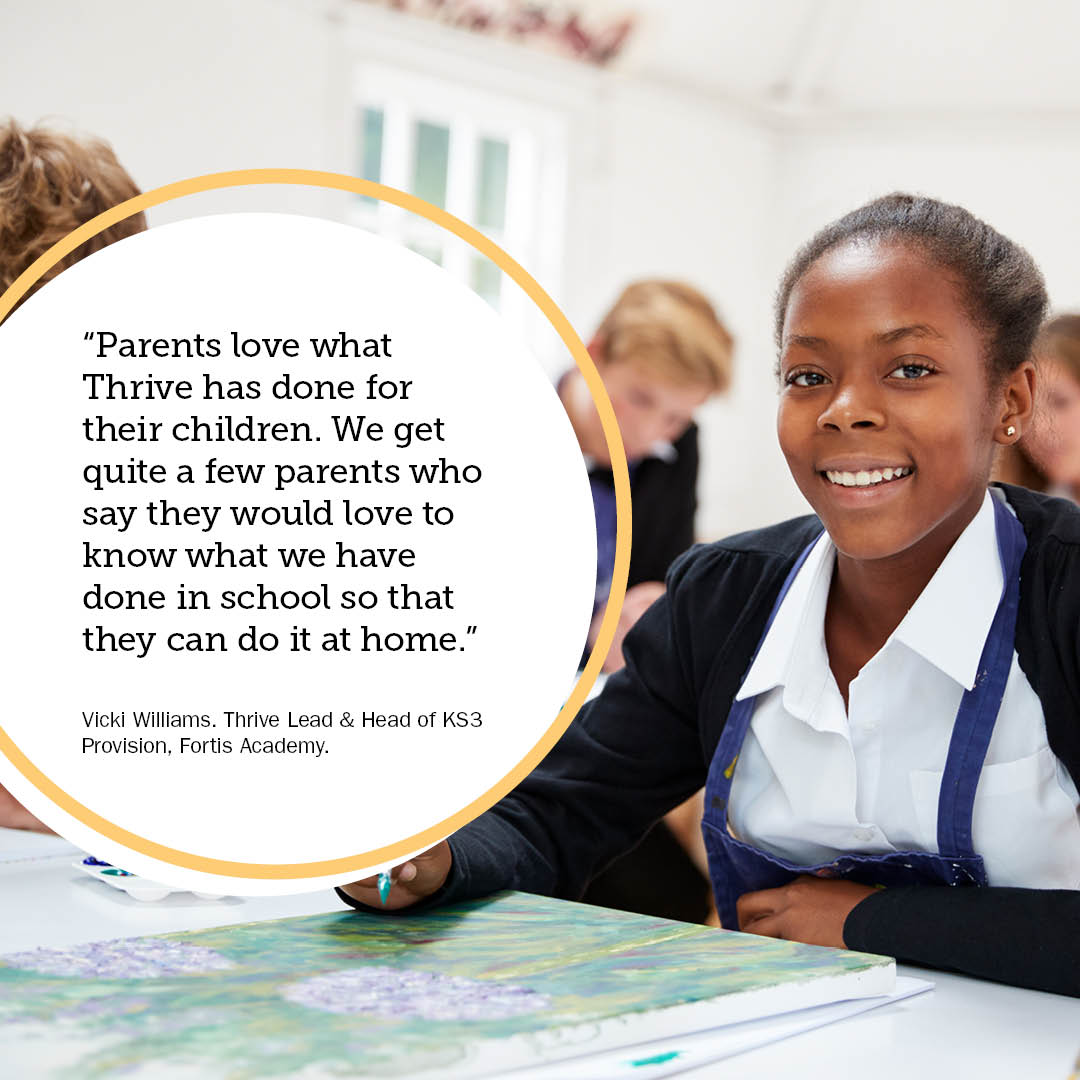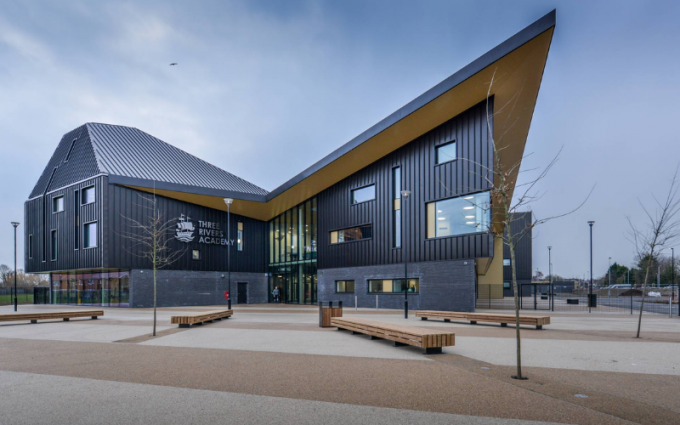Fortis Academy, part of the Shaw Education Trust, is a large secondary school in Birmingham. Eager to reduce classroom disruptions and equip pupils with the resilience and life skills they need, Fortis introduced Thrive in 2020.
With the Covid-19 pandemic presenting unexpected challenges, and as lockdowns continued, pupils’ social skills began to deteriorate.
Read on to discover the ‘life-changing’ training experienced by the Academy’s staff, how non-attenders are now happy to come to school, and why parents love what Thrive has done for their children.
The need for additional support
Fortis Academy is a large secondary school in Birmingham with around 1,800 pupils from over 90 feeder primary schools. Around 47 per cent of pupils qualify for pupil premium funding and above average numbers of pupils have English as an additional language and are eligible for free school meals.
The school is split into a foundation academy for Key Stage 3 pupils and a senior academy for Key Stage 4 pupils with each age group having its own in-house alternative provision (AP) for pupils who are at risk of permanent exclusion.
Thrive was introduced at the school in September 2020 when art teacher Vicki Williams moved to a role leading the KS3 AP, which is called ouR-Zone.
Thrive was recommended by some teacher friends and Vicki researched the Approach and mentioned it to a senior leadership team member who had also heard positive reports about the training. Based on these recommendations, Vicki felt that Thrive would give pupils the resilience and life skills they needed and would help to lower incidents of classroom disruptions. She also believed that it would help pupils whose social skills had been adversely affected by the Covid-19 pandemic.
.jpg)
'Life-changing' training
In September 2020, Vicki and a higher level teaching assistant started their Thrive Licensed Practitioner training, while a member of the school’s senior leadership team completed Thrive’s Leading Emotionally Healthy Secondary Schools course.
Three more staff members are currently being trained and another Thrive Licensed Practitioner has been recruited to the school. Vicki is now doing her Course Leader for Family Thrive training so that the school can introduce Family Thrive sessions for parents and carers.
Another Licensed Practitioner is completing his Train-the-Trainer course so that more staff members can learn about Thrive through in-house training, enabling the Approach to be fully embedded across the setting.
“Before Thrive I had felt a bit stuck in my career and I felt like I needed to do something differently. I wholeheartedly believe that Thrive has been life-changing for me on a personal and a professional level. Understanding the science behind how children’s brains work has changed me as a parent and it’s helped me to understand, on a professional level, how many difficulties some children may be facing before they even come into school,” said Vicki.
Increasing demands of the pandemic
The Thrive Approach has been swiftly embedded into the KS3 ouR-Zone and there are plans to roll it out into the KS4 equivalent. Because of the increased demands of the pandemic on both time and mental health, staff have been given the opportunity to receive Continuing Professional Development about using Thrive on a voluntary basis, with 45 staff already signed up. During these sessions, staff were shown how to screen children using the Thrive-Online (TOL) assessment and action-planning tool.
“We wanted feedback about Thrive and how effective it is to spread by word of mouth. Because of the pandemic, we didn’t want staff to feel it was yet another thing they had to do. We have found that when we tell staff about how they can screen children using TOL, they tell everyone else in their department about how well it works which then encourages other staff to find out more,” said Vicki.
Tailored action plans
Most TOL screenings are done on an individual basis, with Thrive work primarily done on a one-to-one basis. Most pupils have fundamental emotional needs and Thrive sessions are planned to fit with their individual level of need. Some children have five sessions a week, while others may have one session every two weeks.
Fortis Academy also works with external providers including the Prince’s Trust, a cognitive behavioural therapist, an art therapist and a literacy programme. The Thrive Approach has worked well in combination with these and has proved easy to embed in the school – despite the restrictions of social distancing during the Covid-19 pandemic.
“Thrive has been very flexible and it hasn’t really mattered where people are,” added Vicki.
Using Thrive to take a preventative approach to mental health problems has also helped the school to respond to the needs of its pupils in the wake of the pandemic.
Building resilience and boosting attendance
“Our pupils are more resilient now as a result of Thrive and this will mean that their grades will increase. Thrive is teaching them empathy and to take on another person’s point of view, which has helped their window of tolerance to grow,” said Vicki.
Because Thrive has been embedded at Fortis Academy for a relatively short period of time, the effects have yet to show up on school data but there is a wealth of anecdotal evidence to support its impact.
“We had one pupil who had been excluded a number of times and he has recently received an award for the most improved pupil. There has been a total change in him and he now feels more understood. In turn, his mum is much more engaged because she feels like school is working with him and with her – Thrive has made it a much happier picture,” added Vicki.
“Parents love what Thrive has done for their children. We get quite a few parents who say they would love to know what we have done in school so that they can do it at home. We had one school refuser who has not been in school since Year Four because when he was in primary school he was forcibly dragged in and that caused a huge amount of trauma for him. He’s had Thrive sessions and is now willing to come into school because he understands that it’s OK to feel fear before he comes in. His mum has been amazed at how far he has come.”

Fortis Academy is now planning to work towards Ambassador School status and other schools within its multi-academy trust are considering beginning their journeys with Thrive as a result of the impact it has had.
Over to you
Reduced anxiety and behavioural incidents. Calmer classrooms filled with engaged leaners. Improved relationships with parents and carers. These are just some of the outcomes reported by settings embedding Thrive’s whole-school approach to mental health and wellbeing. Are you ready to join them? To get started, click here to book a zero-obligation Discovery Call with your regional expert. Designed to fit in around your schedule, these free 30-minute conversations via Teams give you a chance to have your questions answered, decide if our service is a fit for your needs, and identify if you qualify for a £1,200 DfE grant to spend in your setting.
Pass it on
Small actions can lead to a big ripple effect. If you enjoyed this post or found it helpful, please consider supporting us in our mission to help every child and young person feel safe, supported and ready to learn by sharing it using the social media buttons below.
Want to join a like-minded community of senior leaders and classroom staff benefitting from insights and strategies to improve attendance, behaviour and attainment? Add your email address below. (It’s easy to unsubscribe).

_680.jpg)
_680.png)
_680.png)
_680.jpg)
